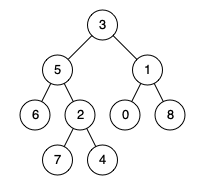1 Description #
source: https://leetcode.com/problems/lowest-common-ancestor-of-a-binary-tree/
Given a binary tree, find the lowest common ancestor (LCA) of two given nodes in the tree.
According to
the definition of LCA on Wikipedia: “The lowest common ancestor is defined between two nodes p and q as the lowest node in T that has both p and q as descendants (where we allow a node to be a descendant of itself).”
Example 1:

Input: root = [3,5,1,6,2,0,8,null,null,7,4], p = 5, q = 1
Output: 3
Explanation: The LCA of nodes 5 and 1 is 3.
Example 2:

Input: root = [3,5,1,6,2,0,8,null,null,7,4], p = 5, q = 4
Output: 5
Explanation: The LCA of nodes 5 and 4 is 5, since a node can be a descendant of itself according to the LCA definition.
Example 3:
Input: root = [1,2], p = 1, q = 2
Output: 1
Constraints:
- The number of nodes in the tree is in the range
[2, 10^5]. -10^9 <= Node.val <= 10^9- All
Node.valare unique. p != qpandqwill exist in the tree.
2 Solution #
/**
* Definition for a binary tree node.
* struct TreeNode {
* int val;
* TreeNode *left;
* TreeNode *right;
* TreeNode(int x) : val(x), left(NULL), right(NULL) {}
* };
*/
class Solution {
public:
TreeNode* lowestCommonAncestor(TreeNode* root, TreeNode* p, TreeNode* q) {
// Space complexity: O(1)
// Time complexity: O(N)
find(root, p, q);
return ancestor_;
}
bool find(TreeNode* root, TreeNode* p, TreeNode* q){
if(!root){
return false;
}
int left = find(root->left, p, q)? 1: 0;
int right = find(root->right, p, q)?1: 0;
int mid = (root->val == p->val || root->val == q->val)? 1: 0;
if(left + right + mid >= 2){
ancestor_ = root;
}
return (left + right + mid) > 0;
}
private:
TreeNode* ancestor_ = nullptr;
};